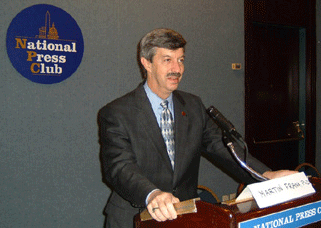|
|
|||||||||
|
|
|
|
|
|
|
||||
 Good Morning!
Good Morning!
My name is Martin Frank and I will be the moderator for today�s panel presentation on the Washington DC Principles for Free Access to Science. I am also the executive director of the American Physiological Society, a not-for-profit membership society and publisher founded in 1887.
[Who We Are]
The panelists I will shortly introduce represent leading scientific, health and medical member organizations with over 600,000 scientists and physicians. These organizations have collectively published and archived over 800,000 articles on their journal web sites with over half of the articles available at no cost to the reader.
[How We Came To Be]
The Washington DC Principles for Free Access to Science grew out of discussions the signers have been having since 1996 about how best to enhance the experience of readers who use our online journal content. By last fall, however, we began to wonder if the voice of small, not-for-profit publishers could be heard above the noise being generated by advocates of open access publishing and concerns about subscription prices charged by commercial publishers. Against this backdrop we decided we could --and should -- be heard.
[What We Stand For]
As indicated in our press release, proponents of the DC Principles see their mission as one which maintains and enhances the independence, rigor, trust, and visibility that have established not-for-profit scholarly journals as reliable filters of information emanating from clinical and research laboratories.
Since the late 1990s, these not-for-profit publishers have sought to make the content of their journals as accessible as possible to their members, the scientific community and the public within the framework of their business models. In some cases, that means that content is freely available almost immediately or after a short delay based on the society�s business model. Even when the content is under access control, non-subscribers can gain access to individual articles for a small fee. We not-for-profit publishers have to be fiscally responsible to our organizations and to our members to ensure our ability to continue to publish the scientific and medical research of our authors and to maintain the integrity of our online journal collections.
The organizations who have signed the DC Principles are not �for profit� organizations � nor are we �for loss� organizations. Many of our organizations do make profits from their journals, or from their scientific meetings. However, as �not-for-profit� publishers, any profit that we make goes back into our organizations for the development of the next generation of scientists, through awards, fellowships, meetings and conferences, and outreach to the community.
The signers of the DC Principles use business models that derive revenue from multiple sources in order to make their content as freely available as possible to their communities, to the public, as well as to scientists in underserved countries. It is difficult for us to envision how a business model dependent on one revenue source can succeed in an era of shrinking Federal support for science and in which many US and foreign scientists are undertaking research on limited budgets.
Today�s panel represents a collaborative effort to tell our story, the story of the not-for-profit publisher. Let me introduce the panelists to you now. I would appreciate your holding your questions until the end.
Dr. Robert D. Wells is President of the Federation of American Societies for Experimental Biology (FASEB) representing 22 professional societies and more than 65,000 biomedical research scientists. Dr. Wells is the former associate editor of the Journal of Biological Chemistry and is currently the Director of the Center for Genome Research at the Institute of Biosciences and Technology, Texas A&M University, Houston, TX.
John K. Iglehart is the editor of Health Affairs, a journal he founded under the aegis of Project HOPE in 1981. Health Affairs is a peer-reviewed, multidisciplinary journal, and the largest circulation health policy periodical published in the United States. Mr. Iglehart holds a degree in journalism from the University of Wisconsin-Milwaukee and is a member of the Institute of Medicine.
Dr. Alice Villalobos is an Assistant Professor in the Department of Environmental Medicine at the University of Rochester School of Medicine and Dentistry, Rochester, New York. Since she was a graduate student, Dr. Villalobos has been mentored by the American Physiological Society thanks to funds derived in part from the Society�s publication program and applied to education and training fellowships and minority outreach programs.
Karin Wittenborg has been University Librarian at the University of Virginia since September 1993. She currently serves on the Advisory Council for Stanford's Academic Computing and Libraries, Brown University's Committee on Information Resources, and on the Executive Committee of the Digital Library Federation.
Dr. William Rosner is Professor of Medicine and Associate Dean, College of Physician and Surgeons, Columbia University, and Director, Institute of Health Sciences, St. Luke's-Roosevelt Hospital Center, New York, New York. Dr. Rosner has served as Chair of the Publications Committee for the Endocrine Society. His major area of clinical interest is androgenic disorders in women.